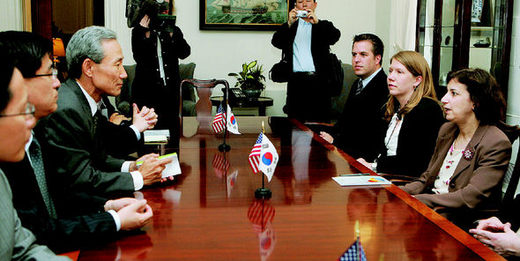Ministry fears effects of FTA on healthcare system
The Hankyoreh | Seoul | 6 June 2006
Ministry fears effects of FTA on healthcare system
If U.S. demands are met, drug prices will rise, they say

South Korean consumers will pay more for pharmaceuticals if U.S. demands on a free trade agreement between the two countries are met, according to the Ministry of Health and Welfare.
Ministry documents obtained by the Hankyoreh detail expectations that the U.S. will request agreement on drug prices during the four-day FTA negotiations between the two countries, which began June 5 in Washington, D.C. and Geneva, Switzerland. The U.S. is also forecast to demand opportunities for U.S. pharmaceutical companies to either adjust or submit objections to drug pricing systems in South Korea, the documents showed.
“If our government accepts U.S. demands as requested, it will prompt prescription drug prices and their insurance costs to rise in the mid- and long-term,” the ministry analyzed. The ministry is particularly wary of the effects such an agreement would have on the nation’s health insurance system, the documents showed.
In another document obtained by the Hankyoreh, the ministry expects the U.S. to request South Korea to extend the patent period of copyrighted drugs, as well as other measures which would increase the price of generic drugs while limiting their flexibility of use. “If the U.S. demands are met, it will undermine the domestic generic drug industry and force insurance-covered drug prices to rise,” the documents read.
“During this round of talks, the U.S. is expected to present its strong position in order to force South Korea to bow to demands by [multinational drug] companies,” the ministry said. The ministry expected this to be a major hurdle to overcome in the free trade talks.
Intellectual rights and the value of innovation
The ministry expects the U.S. to force South Korea to accede to their pricing of innovative drugs during the first round of FTA talks. The U.S. is also forecast to demand South Korea set ‘transparent procedures’ in its pharmaceutical policy. For instance, the South Korean government would have to notify U.S. pharmaceutical companies whenever it changes drug-related policies, including prices, and the companies would be able to submit their "opinions" on the matter. The Korean ministry called such measures an institutional tool to prevent the Korean government’s drug policy from conflicting with the interests of U.S. pharmaceutical companies.
Another contentious area during the FTA talks may be the protection of intellectual property rights, the ministry expected. In past trade talks, the U.S. argued that South Korea has shirked on its responsibility to protect copyrighted pharmaceuticals because of a too-close relationship between the Korea Drug and Food Administration and the Korean Intellectual Property Office.
Insurance system in jeopardy
If South Korea accedes to U.S. demands, it will significantly undermine its power in negotiating insurance-covered drug prices with U.S. pharmaceutical companies, the ministry expected.
The Korean ministry’s evaluation was based in part on a recent accord between the U.S. and Australia. The Australian upper house pointed out that the drug policy agreement signed with the U.S. was aimed at accepting U.S. demands, rather than promoting the health of the people of Australia.
The release of this information has drawn attention from public health and civic organizations, which raised concerns about whether the Korean negotiators are up to the task of defending the health-care rights of the people of South Korea, as they are expected by some to err on the side of economics in the negotiations. Civic groups anticipated the result to pose an overall negative impact on the Korean health and medical policies.
But an easy acquiescence with U.S. demands is not expected. "Prerequisite reviews are necessary regarding the impact of U.S. demands on domestic pharmaceutical companies, insurance-covered drug prices, and the overall domestic legal system,” the Korean ministry’s documents read.





